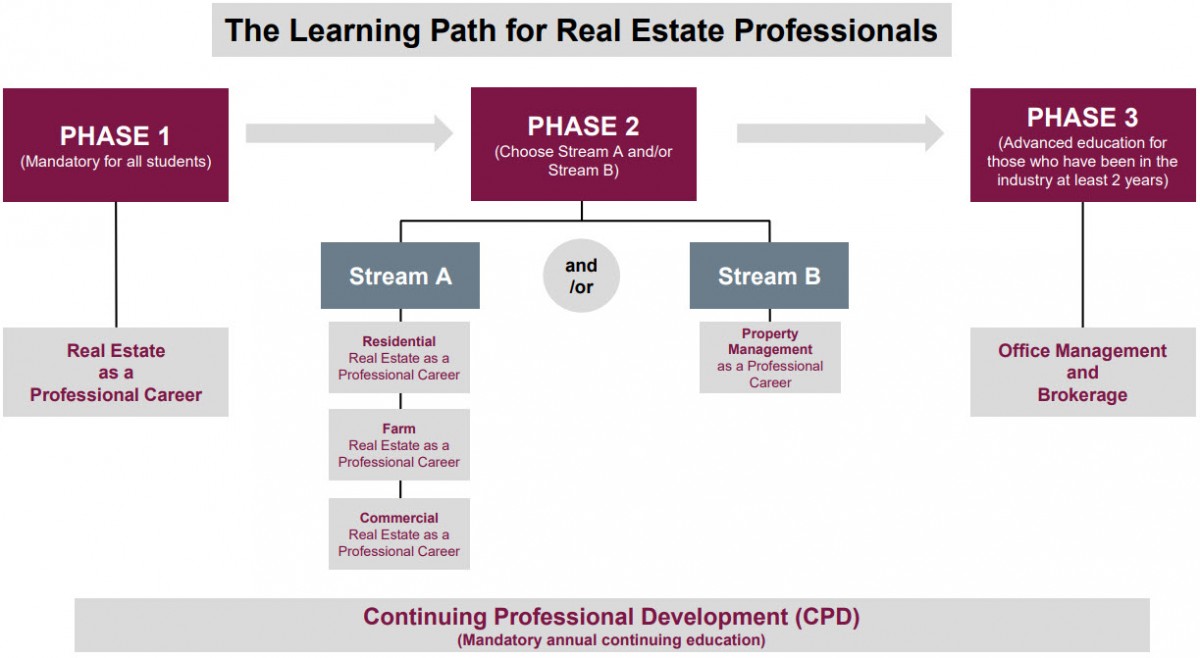

Click HERE to print.
Is this the right career for you?
So you’re thinking of taking on a career in real estate. There are many opportunities for individuals that are interested in pursuing a career in the real estate industry. It is a fast-paced and constantly evolving profession and very rewarding. It is an essential element of Canada’s economy and influences the financial side of life for all Canadians. Real estate offers an extremely wide variety of specialties such as residential, commercial, farm, property management, leasing, investment real estate, land development, counselling and research. Each day and in every corner of our country, thousands of real estate deals worth millions of dollars are negotiated by educated, qualified and experienced real estate professionals (registrants).
However, your decision to undertake a career in real estate, as with the choice of any career or profession, merits very careful consideration. It is a field in which you may easily misjudge your future. Each year many individuals expend time, effort and money to enter the real estate industry only to discover that they cannot complete the required licensing/registration courses and examinations or, having done so, that they are unsuited to the work. Being a registrant in Saskatchewan requires a broad base of specialization in real estate. It isn’t easy and isn’t expected to be, given the depth of knowledge required in regards to the legal, technological, marketing and other complex issues particular to the profession of real estate. Each of the above mentioned specialized areas requires a unique understanding of the issues, and generalized and specific legislation and governance involved.
The Saskatchewan Real Estate Commission (the Commission) is the provincial legislative body which governs and directs the licensing, education and continuing professional development (CPD) of all soon-to-be and existing registrants. As such, we provide a variety of educational tools to achieve success. If you have the drive and determination required, you can count on getting the training, knowledge, guidance and support you require to apply for registration in Saskatchewan.
How to become licensed
Becoming a licensed registrant in Saskatchewan requires a time and effort commitment on behalf of interested individuals. The real estate industry maintains a high standard in licensing by requiring individuals to fulfill comprehensive, demanding education and experience requirements. Though no one is excluded from applying to become a licensed professional in real estate in Saskatchewan, it is required that all applicants successfully meet our comprehensive requirements as per Commission guidelines.
There are a number of levels of licensing and registration that can be achieved during a career in real estate. The diagram above illustrates the paths open to registrants.
Once licensed, an individual’s licence level and/or category may be upgraded with further education. A number of choices exist for licence upgrades. Most individuals selling real estate or managing property in Saskatchewan are representatives licensed to provide trading services or property management services, however, they may choose to become an associate broker or managing broker. Should a licensee wish to upgrade to become an associate or managing broker, they must successfully complete the Broker’s Licensing Course. In order to change your registration status to that of broker, a registrant must have been practicing for at least 2 years over the last 5, and have successfully completed the required education (Phase 3, in the diagram above).
The Saskatchewan Real Estate Commission regulates education and registration for the real estate profession in the province. The Real Estate Division at the Sauder School of Business, UBC delivers this education on behalf of the Commission. You can register for courses through the Real Estate Division at the Real Estate Division's website, here.
Requirements
It is important to note that all applicants for Licensing/Registration must also meet the following eligibility requirements:
- Minimum of 18 years of age
- Minimum of a Canadian high school diploma (or equivalent), or a post-secondary diploma/degree from a recognized institution
- Proven proficiency in English language through the successful completion of the Language Proficiency Requirement
- Be a Canadian citizen or have a permanent resident card or work permit
- Submit a criminal record check by fingerprint comparison, including full disclosure of any criminal conviction or charges.
Criminal record check
The Saskatchewan Real Estate Commission Bylaws require that applicants for a licence/registration submit a criminal record check by fingerprint comparison. The criminal record check is reviewed along with any criminal convictions and charges, which must be disclosed, including if any conditional or absolute discharges were granted. Current policy is that these are not necessarily a bar to registration/licensing, depending upon circumstances and recent record.
In the case of summary conviction offences unrelated to employment, an application for licensing/registration will not be considered until the completion of sentence, parole, probation or payment of fine. Where summary conviction offences are related to real estate employment, application for licensing/registration will not be considered until at least two years after completion of sentence, parole, probation or payment of fine.
Longer waiting periods are imposed for white collar crimes and for indictable offences whether related or not related to employment. If you require further information with respect to a criminal record, please contact the Saskatchewan Real Estate Commission.
The Commission’s policy with respect to a criminal record check may be found here.
Continuing professional development
Registrants are required to complete mandatory CPD, or continuing professional development, every year within the registration year (from July 1 to May 30). This is a mandatory condition for continued registration within the province of Saskatchewan.
Time and money
It requires a serious commitment of time and resources to achieve registrant status in Saskatchewan. Though the licensing and education provided for real estate is inexpensive in comparison to other professional education, it nevertheless requires an output of funds to acquire. Serious consideration needs to be given by each individual as to how much time they have to dedicate to their education as much of it is self-guided. Will you hold a full-time job, be a stay-at-home parent, or be taking other classes during the course of your education? How much of your time is truly flexible? How much money can you put into acquiring the necessary courses, exams and materials to complete the requirements?
In addition to considering the time and money required to become licensed, have you considered post-licensing compensation? For all intents and purposes, a career in real estate means you will be self-employed, though will belong to a brokerage for oversight. The compensation structure is usually commission-based and as such, you will have little or no guarantee of income. Income is affected by your abilities, people skills, hard work, market conditions, property types, and commission structure of your brokerage. You need also take into account the costs of running your own business (computer costs, printing, advertising, taxes, re-licensing fees, brokerage fees, etc.). It will take time, patience and hard work to establish a practice and build up an income to meet your personal requirements. You should have sufficient capital available to support yourself as you work to meet your personal goals.
Choosing a brokerage
Whatever your career aspirations, in order to be a registrant licensed to practice in Saskatchewan, you must be registered by the Commission and engaged by a brokerage. When choosing a real estate brokerage, you may want to consider brokerages in the geographical area in which you intend to conduct your business. Talk to the managing broker at several real estate brokerages to find one with a fee structure and corporate environment that best suits you.
All brokerages have their own ways of operating, so you should ask each of them what makes them different from the others. A phone call or email to brokerages might be a good first step in approaching them. When you apply to the Commission for licensing, you must provide the name of the brokerage with whom you intend to work.
You may change brokerages at any time once you are licensed, but the Commission will need to be informed in order that your licence can be amended.
Remember! You cannot conduct any business unless you are engaged by a brokerage, and any business that you do conduct must be done in the name of, and on behalf of, the brokerage with which you are engaged.
What is the commission?
Real estate is a regulated profession. When preparing for a career in real estate, it’s important to understand both the value of professional regulation and your obligations as a registrant. The Saskatchewan Real Estate Commission (SREC; the Commission) is responsible for regulating the activities of the real estate industry and its registrants in Saskatchewan. The Commission administers The Real Estate Act, and associated Regulations and Bylaws.
The Commission's Mandate
The mandate of the Saskatchewan Real Estate Commission covers the following:
- Registration: The Commission is charged with the responsibility of registering all real estate and property management brokerages, brokers, branch managers and salespeople.
- Education: To maintain high professional standards, the Commission ensures that all mandatory educational requirements are met. To this end, the Commission has established pre-registration courses that allow salespeople to initially begin to trade in real estate and brokers to open their own company, as well as mandatory continuing professional development courses as a condition of continued registration.
- IBTA: The Real Estate Act stipulates that all brokerages are required to maintain an Interest Bearing Trust Account for monies received in trust for any trade in real estate. The Commission audits these accounts to ensure compliance. Interest received is used to promote continuing education for registrants and to sponsor, support and promote research.
- Special Projects: For the overall enhancement of the industry, the Commission is empowered to develop specific projects relating to real estate matters and for educational purposes for all registrants within the province. This is made possible through the monies collected from interest earned through a brokerage's interest bearing trust account.
- Investigations: The Commission is charged with investigating all complaints from within the industry and from the general public as well as handling any discipline through a hearing process as set out in the Act, Regulations and Bylaws.
- REAF: The Real Estate Assurance Fund is designed to provide financial protection to the general public for claims that qualify. Individuals who have lost monies through a deposit that was not placed into a brokerage's interest bearing trust account may make application for recovery of the loss through the Real Estate Assurance Fund.
Protecting the public interest
The Commission regulates the activities of brokerages, brokers, and salespeople trading in real estate in the public interest. The individual and collective interests of consumers and real estate registrants must always be balanced to ensure that the broader public interest is served. Protecting the public interest is achieved through many activities, including:
- Enforcing standards required to obtain and maintain registration as a brokerage, broker, or salesperson and delivering the duties of the registrar
- Establishing minimum requirements for pre-registration and continuing education
- Conducting routine inspections of brokerage office to ensure compliance with The Real Estate Act, the Regulations and Bylaws, and to educate broker
- Addressing inquiries, concerns, and complaints about the conduct of registrants received from all sources and taking appropriate action to protect the public interest
- Establishing and administering insurance requirements, which include consumer deposit protection
- Promoting ongoing education, and competent, knowledgeable, and professional service.

-
Have a question?
Our team is happy to help.